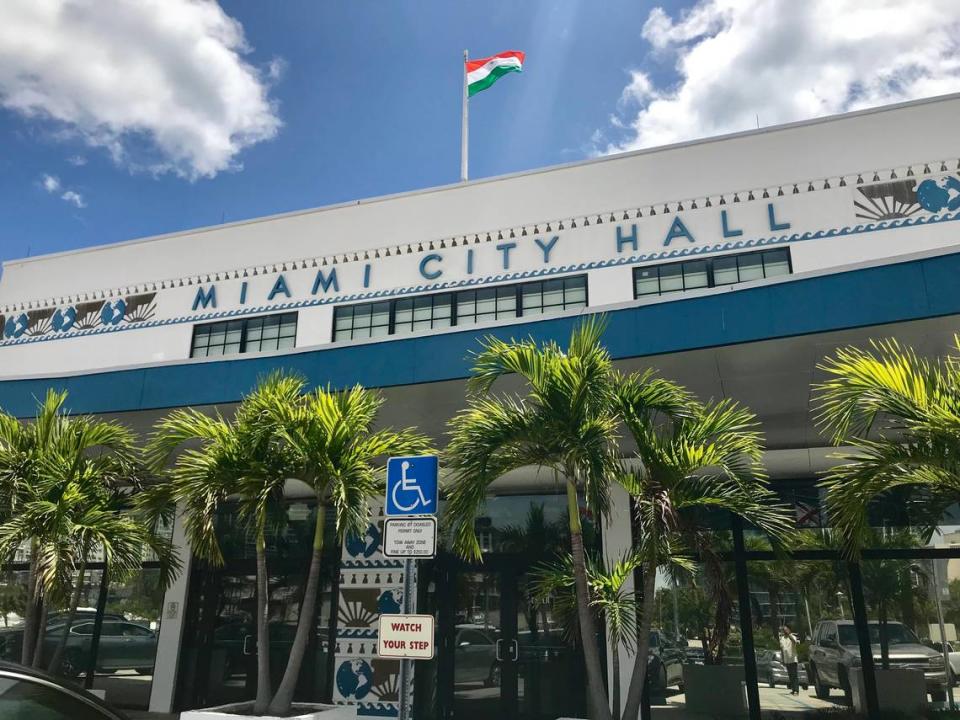Miami’s COVID budget passes with police layoffs, transformed NET and canceled events
The force of COVID-19’s impact on the local economy reverberated through the city of Miami’s $1 billion budget that will cut more than 100 public safety jobs, close the municipal mini-dump to the public, cancel several cultural events and transform some neighborhood administrative centers into outposts for district commissioners.
After a marathon virtual commission meeting Thursday with long debates on extending the city’s motorized scooter program, the process for finding the next police chief and zoning issues, the budget discussion did not begin until midnight.
Around 2:30 a.m. Friday, the budget passed unanimously.
Property taxes remained flat as the city grappled with dipping revenues and a grim outlook for next year. A typical Miami homeowner can still expect to see a slightly higher property tax bill because of home values that increased before the pandemic.
Meanwhile, slumping revenue from sales tax and fee collections blew a hole in some local governments’ spending plans. The Miami budget office projected a $30 million shortfall in the coming year as the economy slowly recovers from widespread closures spurred by the coronavirus pandemic.

Fewer police officers and firefighters
Officials said they could have minimized lost jobs if the city’s two largest labor unions representing police officers and firefighters had agreed to freeze their wages. City Manager Art Noriega and Mayor Francis Suarez said they appealed to Miami’s Fraternal Order of Police and the Association of Fire Fighters, though they couldn’t cut a deal that would avoid layoffs.
Without an agreement for a large wage freeze, administrators instead approved cutting more than a dozen firefighters and 66 sworn police officers.
Between filled and unfilled jobs being eliminated in multiple departments, about 175 positions have been cut from the city’s 4,000-person workforce. According to a budget memo, the cuts will increase detectives’ workloads and curtail their time to investigate cases.
“These reductions will also negatively impact response to victims, lost hours on investigations (increasing the time taken to bring offenders into custody), and other community relations efforts,” reads the memo.
On Friday, police union president Tommy Reyes told the Miami Herald that he disagreed with officials’ characterization of their dealings with the FOP. Reyes said he was “floored” while watching the commission meeting from home and hearing the suggestion that the union wasn’t willing to cooperate.
He said he had positive discussions with the administration, and that they were close to bridging the budget gap before the meeting.
“It’s disheartening,” he said. “We’re trying to help.”
Administrators said Miami’s general employees union, AFSCME Local 1907, agreed to forgo raises, partially lessening the budget crunch. Many departments have filled and vacant jobs being cut, and office supplies and other expenses will get trimmed.
Not discussed during the budget hearing: the city’s division of resilience. Several people left voicemails for the commission asking them to invest in Miami’s efforts to plan for rising seas.
Administrators proposed folding the small resilience staff into the public works department, a move that stirred controversy among climate activists this summer. The city has since made public works director Alan Dodd Miami’s chief resiliency officer and reassured people the resilience team will still have an impactful place in the city.
New NET system for some
In Thursday’s wee hours, some commissioners doubled their office budgets while absorbing more responsibility for responding to constituent complaints.
Commissioner Alex Diaz de la Portilla convinced commissioners and administrators to partly overhaul the city’s Neighborhood Enhancement Team (NET). NET’s system of mini-city halls in several neighborhoods allows people to seek certain permits, complain about litter and access other public services at administrative hubs without having to go downtown.
Diaz de la Portilla argued that moving some of NET’s functions into new district offices run by commissioners would make elected officials more accountable to their voters.
“The people that we represent can go directly to a district office and say, ‘I want this problem solved,’ ” he said. “And if that problem is not solved, guess what happens? That commissioner is not reelected.”
Several callers differed. Liberty City resident Samuel Lattimore echoed many people who called for their NET offices to remain as is and not be placed under the control of politicians.
“We feel that the NET program needs to remain under the city manager,” he said.
Commissioners Keon Hardemon and Ken Russell resisted the changes, choosing to keep the status quo for the NET offices in their district. Despite warnings from Noriega, the city manager, about logistical hurdles, the commission unanimously voted to leave the existing NET system in place in Hardemon’s and Russell’s districts while creating new district offices for Diaz de la Portilla, Joe Carollo and Manolo Reyes.
The three commissioners will see their office budgets balloon by about $1 million, allowing them to hire staff to handle constituent issues. Those city workers would answer to commissioners, while NET workers in Districts 2 and 5 would be supervised by administrators who report to the city manager.
“Having a hybrid system is going to be a little cumbersome,” Noriega said.
“You’ll figure it out,” Diaz de la Portilla responded. “That’s why you get paid the big bucks.”
Closures and cancellations
Under the budget that begins Oct. 1, the city’s mini-dump will close to the public. It will only be open for city personnel. In summer 2021, the city plans to save $548,000 by opening Grapeland Water Park only on weekends.
Commissioners also agreed to cancel much of the calendar of city-sponsored cultural events, which cost hundreds of thousands of dollars.
The New Year’s celebration at Bayfront Park, the Three Kings Parade and the Gay 8 Parade were all defunded.
At Hardemon’s request, the commission agreed to steer $150,000 toward the annual vigil for Martin Luther King Jr. in April. A scaled-back event would be put on if COVID restrictions permit it.

